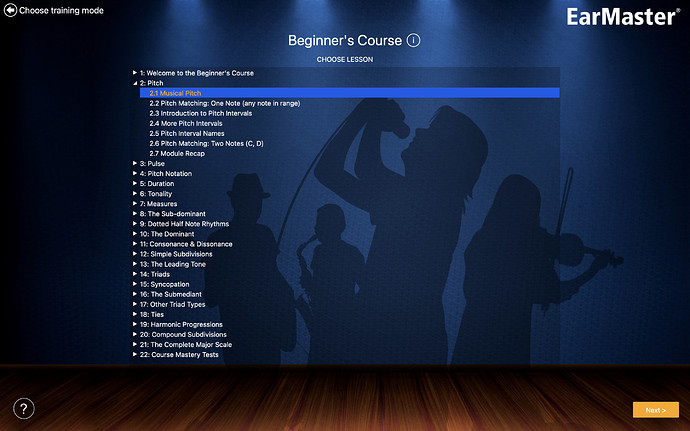Recently I wrote a post about Transcribing (learning a song by ear) and the subject of Ear Training naturally arose.
Our ability to learn songs by ear is aided or hindered by how well developed our ears are. Depending on our genetics and our upbringing we may have a great natural propensity toward being able to hear and recognize the intervals that a melody is composed of, or if you’re like I was at the beginning you’re just TOTALLY STUCK AND DON’T EVEN KNOW WHERE TO START! ![]()
So for those of us in this latter camp, the question may arise:
Is there anything I can do to train my ear to get better so that I can figure out songs more easily?
Thankfully, the answer is a resounding YES! There are things you can do. No matter where we are in our journey, there is always room for us to grow our ears to be able to hear things better.
The first skill to learn is recognizing intervals, the distance between 2 notes.
In my opinion, the best place to start is to learn the major scale, and to sing the major scale using numbers instead of letters. I introduce this concept in my Scales for Beginners lesson.
You can play this game driving in your car, or walking down the street, or in the shower or just about anywhere (although it can feel kinda embarrassing to do it in front of people, lol.)
You start by sing the scale up and down: 1,2,3,4,5,6,7, 1,7,6,5,4,3,2,1
Then you kinda quiz yourself. Can I sing a fifth?
Try: “1 -5 -1”
Did I get it? Let me check “1,2,3,4,5. 1-5-1” Ok yeah I got it, or I didn’t get it.
You go through this sorta process with ALL the intervals. And then once you can sing from 1 up to a 5 (or whatever interval) then can you sing from 1 down to the same interval an octave lower? This sort of process is a GREAT way to begin to train your ear to recognize intervals.
The next game is to have somebody else play an interval and you have to recognize what it is. The first game a described above is a great primer to being able to play this second game, but all these exercises feed each other. Singing them will help you be able to hear and recognize them, and vice versa.
At the beginning it can be really helpful to have some kind song reference to help. Here’s a few I remember using for recognizing ascending intervals:
Major 2nd - beginning of Happy Birthday
Perfect 4th - beginning of Here Comes the Bride
Perfect 5th - beginning of Twinkle Twinkle
Major 6th - My Bonnie Lies Over the Ocean
Minor 7th - Star Trek
I’m sure you could search “Ear Training” or “Ear Training Games” on YouTube and you could find a whole bunch of stuff.
When I studied music at Oberlin way back in the day we had to take classes called Aural Skills that were these kind of ear training exercises:
Site Singing
Interval Recognition
Rhythm Recognition
Chord Recognition
Chord Progression Recognition
Transcribing
If you really want to get serious about this, there is a resource that I’d highly recommend called EarMaster. It looks like they have 2 options: you can pay $3 or $4 a month to subscribe on all your devices, or you can pay a one time fee of $60 to have it just on your computer. BTW - I’m not getting any money from them for sharing this with you.
It’s on EarMaster 7 now, I bought it when it was on EarMaster 5 about 20 years ago, and I spent SO MUCH TIME doing it. It’s actually fun and almost kind of addictive. And it’s fun to see your progress. At the beginning you’re like, “I have no frickin idea. I’m just totally guessing” and then after a week you’re like, “oh I’m actually starting to hear the difference.”
The other thing I love about this resource is you can start SO EASY, just which of these intervals is bigger (which notes are farther apart and which ones are closer together) and it has a built in tutor that once you’re getting the answer right more often than not, it moves you on to the next level.
It has interval recognition, chord recognition, chord progression recognition, rhythm stuff where it plays a rhythm and you have to tap it back on your space bar, and it looks like they’ve added a whole bunch more stuff.
You can literally get thousands of dollars of collegiate level education for $60 or for $50/year depending how you wanna do it. I’m actually considering subscribing. If I could only do it on my computer I probably wouldn’t do it because I’m so busy, but if I could do it when standing in line at the grocery store, I might do it! I’ll let you know if I decide to pull the trigger…
So that’s my introduction to the topic of Ear Training. What do you think? You got any thoughts on the subject? Lemme hear 'em!
Rock on,
Luke



 )
)
